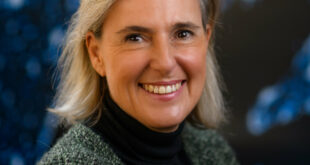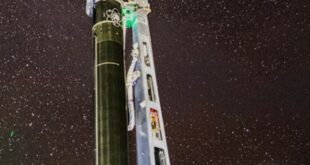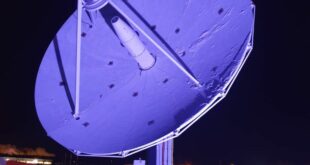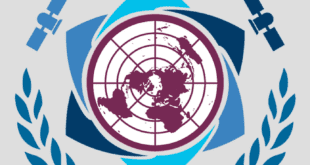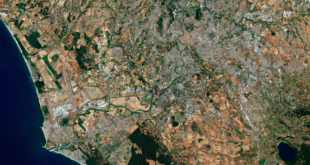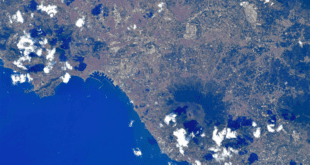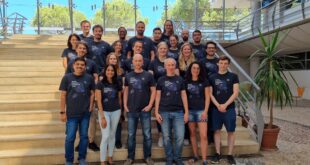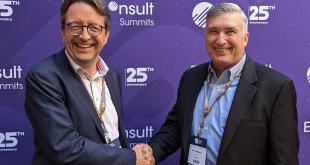In this Space Café Radio, SpaceWatch.Global publisher Torsten Kriening spoke with Simonetta Cheli, Director of Earth Observation Programmes and Head of ESRIN (D/EOP) at the European Space Agency (ESA) at the 15th European Space Conference in Brussels. This conference is one of the very important yearly high-level gatherings of the key stakeholders of the European space domain in the Egmont Palace in Brussels under the 2023 theme “Securing the Future of Europe in Space”.
Read More »Synspective and Insight Terra Partner for Mining Solutions
Synspective and Insight Terra have entered into a strategic partnership to deliver a new space-enabled data and monitoring solution for the mining industry. The solution uses satellites and earth observation, and ground sensors to monitor mine tailings facilities.
Read More »Viasat Sells Link 16 TDLs Business to L3Harris Technologies
Viasat Inc, a global leader in satellite communications, has completed the sale of its Link 16 Tactical Data Links (TDL) business to L3Harris Technologies for approximately $1.96 billion in cash. Viasat expects the net proceeds from the sale to be approximately $1.8 billion after estimated taxes, fees, and other expenses. Furthermore, Viasat intends to use the proceeds to reduce net leverage and increase liquidity.
Read More »Space Café Radio – with Aakash Parekh
In this Space Café Radio - SpaceWatch.Global's Marketing Intern Jim Murphy spoke with Aakash Parekh, the Chief Commercial Officer at Pixxel. Pixxel is a space data company building a constellation of hyperspectral earth imaging satellites with the aim of detecting, monitoring and predicting global phenomena.
Read More »#SpaceWatchGL Opinion: Cybersecurity and climate change: a common cause for the space industry
The least we can say is that 2022 has been an eventful year on the world stage, and with no doubt, space took a major part in the headlines. From global environmental challenges to the sudden perception of a war fought Europe's backyard, the space domain and its technology have suddenly reached a level of public awareness and public utility never experienced before. What have we learned from the year that has just gone by, and what still needs to be addressed?
Read More »#SpaceWatchGL Opinion: Game-changing Geospatial Data for Earth Applications – SGAC STEA Group
Space Technology for Earth Applications (STEA) is a rapidly growing project group of the Space Generation Advisory Council (SGAC). As of today, the group consists of 376 members from 78 countries worldwide. The mission of the group is to provide a platform for space enthusiasts to discuss various topics related to the usage of space-related technology to monitor the Earth such as climate change adaptation, disaster management, environmental monitoring, urban planning, and pollution mapping. This year, two of our most active projects are related to flood assessments through the usage of satellite imagery and social media data.
Read More »Four Italian EO Companies Jointly Establish OSIRIDE
D-Orbit spa, Exprivia spa, Planetek Italia srl, and Serco Italia spa have established OSIRIDE (Operational Solutions for IRIDE) to generate ideas by fostering the emergence of startups and innovative approaches for the development of the Iride satellite constellation. OSIRIDE will also extend benefits to a broad ecosystem of SMEs and startups in all Italian regions, thus ensuring innovation and further boosting the growth of aerospace districts.
Read More »#SpaceWatchGL Opinion: Italy’s Strategy and Position at the next ESA’s CM-22
The space sector has completely changed in the past few years. France is now the driving force behind the European space sector (albeit more for its purposes rather than for shared European goals), and Germany, apparently distracted by national rearmament, is still determined to defend its ambitions, so as not to completely leave the ground to Paris. In the face of all this, what is Italy’s position? Further apart, it appears.
Read More »#SpaceWatchGL Opinion: ISU SSP22 Special – Team Project – Space-Ocean-Climate Interactions
The Ocean is the birthplace of our species and essential to our survival. It is responsible for producing approximately one third of oxygen on Earth and allows the regulation of Earth’s climate. The oceans are also an important source of food and 10% of world’s population depend on it. Since the advent of space in 1958 humans have learned to use satellites to observe our planet.
Read More »Satellite Vu partners with Viasat
Earth observation company Satellite Vu, has partnered with communications company Viasat, to ensure rapid commanding, reception and dissemination of thermal imagery from Satellite Vu’s satellites, the company said. According to the partnership agreement, Viasat will serve as the company’s exclusive ground service provider.
Read More » SpaceWatch.Global An independent perspective on space
SpaceWatch.Global An independent perspective on space

